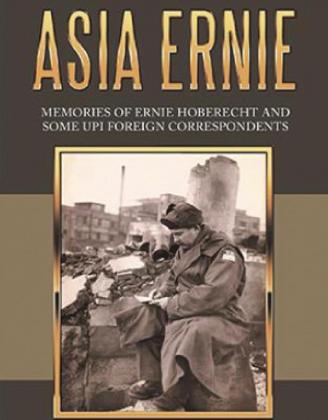In 1946, Earnest Hoberecht (pronounced Hobright) learned that the U.S. military had banned American books throughout occupied Japan, not wanting the locals to read any critical depictions of the United States.
Hoberecht sensed an opportunity. Filling the void, he quickly dashed off the novel "Tokyo Diary," had it translated into Japanese and then followed that up with the smash hit "Tokyo Romance." Hoberecht was suddenly the most popular novelist in postwar Japan; many Japanese women even became card-carrying members of the Hoberecht Fan Club.
Hoberect's successful novels are just one "chapter" of the fascinating life detailed in "Asia Ernie: Memories of Earnest Hoberecht and Some UPI Foreign Correspondents." Authored by Patrick Killen, a longtime foreign correspondent who worked under Hoberecht for seven years, "Asia Ernie" is a fitting tribute to the globetrotting reporter and bureau chief who got his start right here in Watonga, and even wrote for the Watonga Republican.
Hoberecht was born on New Year's Day, 1918. Arriving in Tokyo immediately after the war, Hoberecht spent two decades as Asia bureau chief for United Press International, a now-defunct news agency that competed with the Associated Press for stories and scoops across the globe.
Along the way, Hoberecht had several marriages, became a popular novelist and made stops across his news empire in cities like New Delhi, Jakarta, Saigon and Manila.
In addition to reminiscences about the man himself, "Asia Ernie" includes stories and anecdotes about correspondents like Joe Galloway, Leon Daniel and Bob Miller. Hoberecht and his fellow reporters became confidants of consequential men like General Douglas MacArthur, witnessed the horrors of war, interviewed heads of state, and enjoyed themselves in cities across the globe. Their lives make for great reading.
Hoberecht's achievements eventually earned him induction into the Oklahoma Journalism Hall of Fame and the Oklahoma Hall of Fame.
Watonga itself is an important part of the book. Hoberecht never abandoned his childhood home, returning to visit throughout his career and then moving back for good when he was let go by UPI in 1966. He became a staple of the community, taking over the family abstract business while also getting involved in Kiwanis, the chamber of commerce, and more. He even contributed a weekly humor column to the Watonga Republican to promote his insurance company.
Late Watonga Republican publisher Tim Curtin is quoted extensively in the book. "Through the years, I sold papers because Ernie Hoberecht was hot copy," he told Killen. "He was kind of a lightning rod for Watonga."
Anyone who enjoys local history, journalism, current events or adventure stories will find plenty to like about "Asia Ernie." It is not a hagiography of Hoberecht; Killen lets Hoberecht's detractors have their say, some of whom accused the newsman of playing fast and loose with the facts and, especially, being tight-fisted with UPI money.
Galloway described Hoberecht as a complicated contradiction: "supremely self-confident; a silvertongued devil; a fraud and a charlatan; a country boy from Oklahoma who affected three-piece banker's suits ... a man who could only have happened where and when he did."
But despite being cleareyed about Hoberecht's perceived faults, Killen comes down on Ernie's good side. "It was easy to like Ernie," he writes. "Usually cheerful with a good sense of humor. I always thought of him as a friend."
"Asia Ernie" is available on Amazon and through Xlibris. It's also available as an e-book on Kindle and Apple devices.

